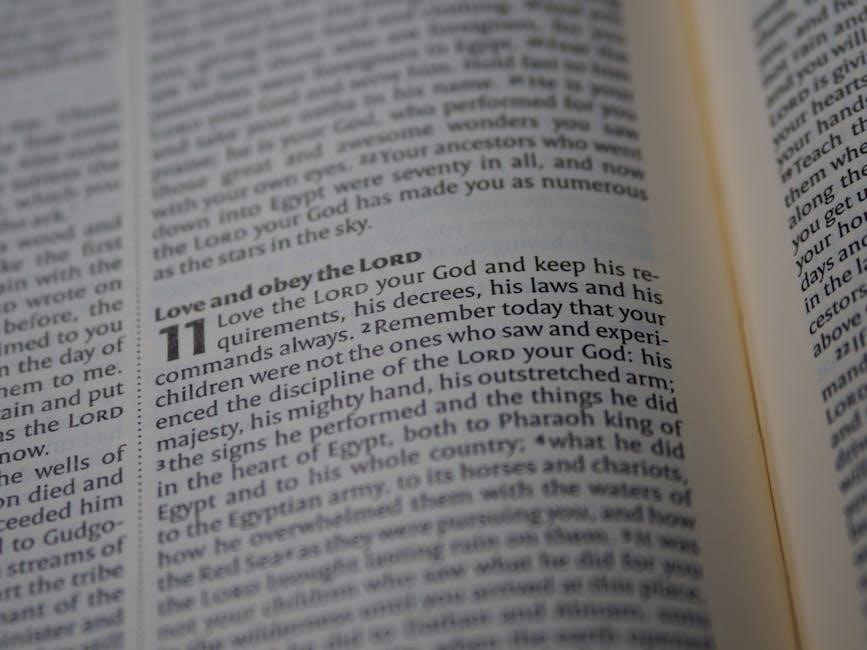Book of Discipline UMC PDF: An Overview
The Book of Discipline UMC serves as the foundational document outlining the United Methodist Church’s doctrine, governance, and social principles. It’s available in PDF format, offering accessibility to clergy and laity, guiding church operations and ethical standards.

What is the Book of Discipline?
The Book of Discipline of The United Methodist Church is a comprehensive collection that contains the laws, doctrines, and administrative guidelines governing the denomination. Published every four years after the General Conference, it reflects the evolving understanding and policies of the church. It’s more than just a rulebook; it embodies the Wesleyan way of serving Christ through disciplined Christian living and firmly reflects the doctrine of the Church.
This book is instrumental in shaping the collective future and embracing the shared heritage of United Methodists worldwide. It serves as a manual for effective ministry under the Holy Spirit, guiding clergy and laity in their roles within the church. The Book of Discipline provides a framework for church operations, ensuring consistency and adherence to established principles across various congregations and conferences. It outlines the expectations for both clergy and laity as they witness Christ, shaping the policies and polity of the United Methodist Church.
Purpose and Function of the Book of Discipline
The Book of Discipline serves as the central guiding document for the United Methodist Church, offering a comprehensive framework for its organization, governance, and mission. Its primary purpose is to outline the laws, doctrines, and social principles that define the denomination’s identity and guide its actions. Functionally, it acts as a constitution, setting forth the plan by which United Methodists govern themselves, from local churches to general agencies.
Furthermore, the Book of Discipline provides a common ground for United Methodists worldwide, fostering unity through shared doctrine and a connectional covenant. It clarifies the expectations for clergy and laity, ensuring accountability and promoting effective witness in the world. The book also facilitates the resolution of disputes and provides a basis for disciplinary action when necessary, maintaining order and upholding the integrity of the church’s mission and values. It’s a constant instrument for the Church.

History of the Book of Discipline
The Book of Discipline’s history began in 1784 with the Methodist Episcopal Church. It’s updated every four years after the General Conference, reflecting evolving legislation and church doctrine.
Origins in the Methodist Episcopal Church
The genesis of the Book of Discipline lies within the Methodist Episcopal Church, dating back to 1784. This initial version served as a foundational document, outlining the church’s doctrines, rules, and organizational structure. It provided a framework for early Methodists to govern themselves and spread their message.
This original text established precedents for subsequent editions, shaping the evolution of Methodist polity and practice. The Book of Discipline quickly became an essential resource for clergy and laity alike, offering guidance on matters of faith, conduct, and church administration.
Its publication marked a significant milestone in the development of Methodism, solidifying its identity and establishing a clear path for future growth. This foundational document has been revised continuously.
Evolution Through General Conferences
Since its inception, the Book of Discipline has undergone continuous evolution, primarily through revisions made at the General Conference, the UMC’s top legislative body. Held every four years, these conferences provide opportunities to amend, update, and adapt the Book of Discipline to address contemporary issues and reflect the changing needs of the church.
The General Conference considers proposals from various committees, task forces, and individual members. These proposals often address theological interpretations, social concerns, and administrative policies. Through deliberation and voting, delegates determine which changes to incorporate into the latest edition of the Book of Discipline.
This process ensures that the Book of Discipline remains relevant. Each edition reflects the ongoing dialogue and discernment within the United Methodist Church.

Key Components of the Book of Discipline
The Book of Discipline encompasses doctrine, social principles, and church governance. These key components provide a comprehensive framework for United Methodist belief, action, and organization across the connection.
Doctrine and Theology
Within the Book of Discipline, doctrine and theology form a cornerstone, reflecting the Wesleyan heritage. It articulates core beliefs, providing a theological framework for understanding God, humanity, and the world. This section emphasizes scripture, tradition, reason, and experience as sources of theological reflection, guiding United Methodists in their faith journey. Foundational documents express the Wesleyan way of serving Christ through doctrine and disciplined Christian life, reflecting a worldwide denomination united by doctrine. The Book of Discipline constitutes the law and doctrine of the United Methodist Church. The Discipline as the instrument for setting forth the laws, plan, polity, and process by which United Methodists govern themselves remains constant.
Social Principles
The Book of Discipline outlines the United Methodist Church’s Social Principles, offering guidance on social justice issues and ethical living. These principles address a range of topics, including human rights, economic justice, environmental stewardship, and peace. This section encourages members to engage in thoughtful reflection and action to create a more just and compassionate world. The 2020/2024 Book of Discipline marks significant shifts in the polity and policies of The United Methodist Church.The Social Principles of the church follow. Each central conference may make changes and adaptations to the General Book of Discipline to more reflect our understanding of the Church .
Church Governance and Polity
The Book of Discipline provides a detailed framework for church governance and polity within the United Methodist Church. This section covers the structure of the church at various levels, including local churches, annual conferences, and general agencies. It outlines the roles and responsibilities of clergy and laity in decision-making processes, ensuring accountability and order. The Discipline as the instrument for setting forth the laws, plan, polity, and process by which United Methodists govern themselves remains constant. Each General Conference amends The Book of Discipline, and the actions of the 2024 General Conference are reflected in the quadrennial revision.
Accessing the Book of Discipline PDF
The Book of Discipline PDF is accessible through free online editions and purchasable versions from Cokesbury. These resources provide United Methodists with the governing policies and doctrines.
Free Online Editions
The United Methodist Church offers free online editions of the Book of Discipline, making it readily accessible to members worldwide. These digital versions provide a convenient way to search and reference the church’s governing documents. Cokesbury, the publishing house of the UMC, also provides online access. Foundational documents and social principles are also available.
These free resources ensure transparency and enable both clergy and laity to easily consult the Discipline for guidance on church policies, doctrines, and ethical standards. Access to these online resources fosters informed participation in church governance and promotes a deeper understanding of United Methodist beliefs and practices. The online availability also helps reduce costs and environmental impact associated with printing and distribution.
Purchasing Options from Cokesbury
Cokesbury, the official retail arm of the United Methodist Publishing House, offers several purchasing options for the Book of Discipline. Individuals can buy physical copies through their online store or at Cokesbury retail locations. Different formats may be available, including print and digital versions, catering to various preferences and needs.
Purchasing from Cokesbury ensures that you are receiving the official and updated version of the Book of Discipline. These purchases support the publishing efforts of the United Methodist Church. Cokesbury also provides resources and study materials related to the Discipline, aiding in a deeper understanding of church policies. Kindle editions are also sold.
Updates and Revisions
The Book of Discipline undergoes revisions every four years following the General Conference; These revisions reflect changes in church law, doctrine, and policies, ensuring the document remains current and relevant.
Quadrennial Revisions After General Conference
Following each General Conference, which convenes every four years, the Book of Discipline is meticulously reviewed and revised to incorporate the decisions and legislative actions taken during the conference. This process ensures that the Book of Discipline remains a current and accurate reflection of the United Methodist Church’s doctrine, policies, and procedures. The revisions encompass a wide range of topics, from theological interpretations and social principles to administrative guidelines and organizational structures. These changes are carefully integrated into the existing text, maintaining the integrity and coherence of the document. The updated Book of Discipline serves as the official guide for United Methodists worldwide, providing clarity and direction on matters of faith, practice, and governance until the next General Conference.
Impact of the 2020/2024 Revisions
The 2020/2024 revisions to the Book of Discipline UMC are substantial, marking significant shifts in the polity and policies. These revisions reflect ongoing discussions and decisions within the United Methodist Church, addressing evolving social contexts and theological perspectives. The changes impact various aspects of church life, including local church governance, annual conference structures, and the roles of general agencies. Furthermore, the revisions address important issues such as inclusivity, social justice, and the church’s stance on contemporary societal challenges. The updated Book of Discipline provides guidance for navigating these complexities, shaping the direction of the UMC as it strives to fulfill its mission and adapt to the needs of a changing world. The implications of these revisions are far-reaching.

Significance for United Methodists
The Book of Discipline offers vital guiding principles for both clergy and laity within the United Methodist Church. It also provides a framework for church operations, ensuring consistent practices and upholding doctrinal standards.
Guiding Principles for Clergy and Laity
The Book of Discipline serves as a crucial guide, shaping the conduct and beliefs of United Methodist clergy and laity alike. It provides a comprehensive framework encompassing ethical standards, doctrinal interpretations, and expectations for service. For clergy, it delineates their responsibilities in leadership, pastoral care, and upholding church law. Laity find within its pages guidance on their roles in church governance, discipleship, and living out their faith in the world.
The Discipline encourages a disciplined Christian life, reflecting Wesleyan values. Through its clear articulation of principles, it promotes unity within the denomination, fostering a shared understanding of faith and practice. It equips members to be effective witnesses of Christ, contributing to the transformation of the world. Furthermore, it emphasizes the importance of personal and social holiness, challenging individuals to live out their faith authentically in all aspects of life. By adhering to these guiding principles, United Methodists strive to embody the teachings of Jesus and fulfill their calling as disciples.
Framework for Church Operations
The Book of Discipline provides a comprehensive framework that governs the operations of United Methodist Churches at all levels. It outlines procedures for church governance, defines the roles and responsibilities of various committees, and establishes guidelines for financial management. The Discipline details the process for conducting church business, from local church meetings to annual conferences. It addresses matters such as property ownership, clergy appointments, and disciplinary actions.
Furthermore, it offers guidance on implementing church programs, including discipleship initiatives, outreach ministries, and educational activities. By adhering to the established procedures, churches ensure accountability and transparency in their operations. The Book of Discipline promotes consistency across the denomination, fostering a shared understanding of how churches function. It empowers congregations to effectively carry out their mission, making disciples and serving their communities. This standardized framework ensures efficient and ethical management, supporting the overall health and vitality of the United Methodist Church.
